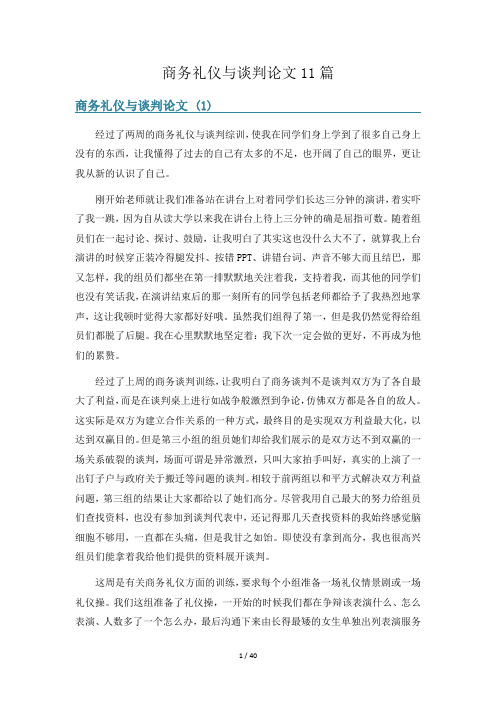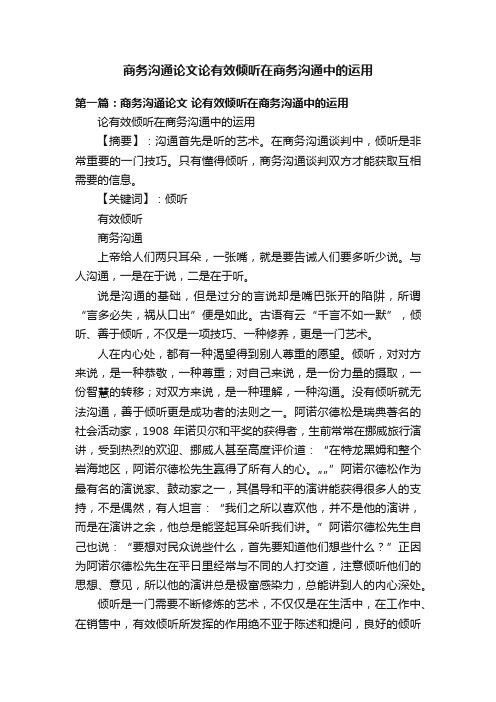商务沟通论文
商务谈判论文7篇

国际商务谈判论文1谈判无处不在,所谓谈判是指参与各方基于某种需要,彼此进行信息交流,磋商协议,旨在协调其相互关系,赢得或维护各自利益的行为过程。
谈判是一个过程,在这个过程中,利益双方就共同关心或感兴趣的问题进行磋商,协调和调整各自的经济、政治或其他利益,谋求妥协,从而使双方都感到是在有利的条件下达成协议,促成均衡。
谈判的目的是协调利益冲突,实现共同利益。
而国际商务谈判是指在国际商务活动中,处于不同国家或地区的商务活动当事人为了达成某笔交易,彼此通过信息交流,就交易的各项要件进行协商的行为过程。
国际商务谈判是商务活动的重要组成部分是国际商务理论的主要内容,是国内商务谈判的眼神和发展。
可以说,国际商务谈判是一种在对外经贸活动中普遍存在的、解决不同国家的商务机构之间不可避免的利益冲突、实现共同利益的一种必不可少的手段。
它是跨越国界的活动,来自不同文化背景的谈判者有着不同的交际方式、价值观和思维方式,这就意味着在国际商务谈判中了解各国不同文化,熟悉商业活动的文化差异是非常重要的。
国际商务谈判的谈判主体属于两个或两个以上的国家或地区,谈判者代表了不同国家或地区的利益。
同时,它还具有跨文化性。
来自不同国家或地区的谈判者有着不同的文化背景,谈判者各方的价值观、思维方式、行为方式、交往模式、语言以及风俗习惯等各不相同,这些文化因素对国际商务谈判的成功与否都将产生直接的影响。
从这个意义上讲,国际商务谈判正确的名称应为跨文化商务谈判,这种谈判极少因技术或专业原因而失败。
在跨文化商务谈判中,东西方民族常常会因为文化积淀、认知方式以及思维方式的不同而遭遇文化冲突。
所以大多失败是由于对外国文化缺乏了解和没有顺应国际经济交往中的规则。
因此在谈判前要做好信息收集工作;在谈判中应掌握好谈判技巧和策略。
而在实际谈判中每一位谈判者都有利益、优先事项和策略。
利益是构成谈判者立场基础的需要或原因,优先事项反映各种利益或立场的相对重要性,谈判策略是为达到谈判目标而选定的一组综合的行为手段。
商务沟通论文

跨文化的商务沟通一、研究的必要性、重要性代尔·卡耐基曾经说过:“一个人的成功,只有15%来自他的专业技术,而85%是靠人际沟通和自身的处事能力”。
国际商务活动既是一种经济活动同时也是一种文化活动,中国商务人员要求在国外寻求市场、供应商、合作伙伴,建立附属公司和合资企业,需要具有不同文化背景。
使用不同语言的商人进行商务往来,很有必要精心研究文化差异对国际商务活动带来的影响,并采取相应的对策,使我国企业在参与国际竞争中,不仅适用国际商务竞争者之间的经济环境,更能适用彼此之间的文化环境。
并且取得竞争优势和获得国际经营主动权。
在跨文化交际中,交际双方都有一种强烈的愿望:希望交际或沟通成功。
但愿望和现实是有距离的。
在跨文化交际中,由于文化不同,很容易造成交际受挫或失败,双方产生误解,甚至造成关系恶化。
随着全球经济一体化的纵深发展,跨文化商务沟通已成为国际贸易活动中的重要研究内容。
由于跨文化商务沟通是在不同文化背景下的人群之间展开的,因此文化之间的差异会构成跨文化商务沟通的阻碍。
二、商务沟通中的文化差异及其影响下面,我将从款待和致谢方式看中英文化差异对商务沟通的影响。
情景1在饭店中,顾客对服务员的夸赞中国顾客:谢谢你的热情服务英国服务员:不要提了中国服务员:这是我应该做的情景2为一个女服务员帮一个年长的男士往宾馆里抬行李男顾客:非常感谢英国服务员:这没什么中国服务员:这是我的责任中英两国在款待和致谢方式上存在很大的不同,由此可以看出文化差异在商务沟通中的体现。
1、言语差异语言是文化的重要部分,同时语言交流也是进行沟通的主要手段,语言由言语和非言语两部分组成,世界上的言语语言种类繁多,因此也对商务沟通产生了巨大的影响,甚至是决定性的作用。
言语的差异主要体现在词汇、句法、语域的差异上。
2、非言语差异在跨文化背景下,商务沟通也受非言语交际差异的影响和制约。
非言语交际包括很多方面,例如手势,眼神,面部表情,肢体语言等等。
商务礼仪与谈判论文11篇

商务礼仪与谈判论文11篇商务礼仪与谈判论文 (1) 经过了两周的商务礼仪与谈判综训,使我在同学们身上学到了很多自己身上没有的东西,让我懂得了过去的自己有太多的不足,也开阔了自己的眼界,更让我从新的认识了自己。
刚开始老师就让我们准备站在讲台上对着同学们长达三分钟的演讲,着实吓了我一跳,因为自从读大学以来我在讲台上待上三分钟的确是屈指可数。
随着组员们在一起讨论、探讨、鼓励,让我明白了其实这也没什么大不了,就算我上台演讲的时候穿正装冷得腿发抖、按错PPT、讲错台词、声音不够大而且结巴,那又怎样,我的组员们都坐在第一排默默地关注着我,支持着我,而其他的同学们也没有笑话我,在演讲结束后的那一刻所有的同学包括老师都给予了我热烈地掌声,这让我顿时觉得大家都好好哦。
虽然我们组得了第一,但是我仍然觉得给组员们都脱了后腿。
我在心里默默地坚定着:我下次一定会做的更好,不再成为他们的累赘。
经过了上周的商务谈判训练,让我明白了商务谈判不是谈判双方为了各自最大了利益,而是在谈判桌上进行如战争般激烈到争论,仿佛双方都是各自的敌人。
这实际是双方为建立合作关系的一种方式,最终目的是实现双方利益最大化,以达到双赢目的。
但是第三小组的组员她们却给我们展示的是双方达不到双赢的一场关系破裂的谈判,场面可谓是异常激烈,只叫大家拍手叫好,真实的上演了一出钉子户与政府关于搬迁等问题的谈判。
相较于前两组以和平方式解决双方利益问题,第三组的结果让大家都给以了她们高分。
尽管我用自己最大的努力给组员们查找资料,也没有参加到谈判代表中,还记得那几天查找资料的我始终感觉脑细胞不够用,一直都在头痛,但是我甘之如饴。
即使没有拿到高分,我也很高兴组员们能拿着我给他们提供的资料展开谈判。
这周是有关商务礼仪方面的训练,要求每个小组准备一场礼仪情景剧或一场礼仪操。
我们这组准备了礼仪操,一开始的时候我们都在争辩该表演什么、怎么表演、人数多了一个怎么办,最后沟通下来由长得最矮的女生单独出列表演服务员,剩下的一女对一男表演。
商务沟通论文论有效倾听在商务沟通中的运用

商务沟通论文论有效倾听在商务沟通中的运用第一篇:商务沟通论文论有效倾听在商务沟通中的运用论有效倾听在商务沟通中的运用【摘要】:沟通首先是听的艺术。
在商务沟通谈判中,倾听是非常重要的一门技巧。
只有懂得倾听,商务沟通谈判双方才能获取互相需要的信息。
【关键词】:倾听有效倾听商务沟通上帝给人们两只耳朵,一张嘴,就是要告诫人们要多听少说。
与人沟通,一是在于说,二是在于听。
说是沟通的基础,但是过分的言说却是嘴巴张开的陷阱,所谓“言多必失,祸从口出”便是如此。
古语有云“千言不如一默”,倾听、善于倾听,不仅是一项技巧、一种修养,更是一门艺术。
人在内心处,都有一种渴望得到别人尊重的愿望。
倾听,对对方来说,是一种恭敬,一种尊重;对自己来说,是一份力量的摄取,一份智慧的转移;对双方来说,是一种理解,一种沟通。
没有倾听就无法沟通,善于倾听更是成功者的法则之一。
阿诺尔德松是瑞典著名的社会活动家,1908年诺贝尔和平奖的获得者,生前常常在挪威旅行演讲,受到热烈的欢迎、挪威人甚至高度评价道:“在特龙黑姆和整个岩海地区,阿诺尔德松先生赢得了所有人的心。
……”阿诺尔德松作为最有名的演说家、鼓动家之一,其倡导和平的演讲能获得很多人的支持,不是偶然,有人坦言:“我们之所以喜欢他,并不是他的演讲,而是在演讲之余,他总是能竖起耳朵听我们讲。
”阿诺尔德松先生自己也说:“要想对民众说些什么,首先要知道他们想些什么?”正因为阿诺尔德松先生在平日里经常与不同的人打交道,注意倾听他们的思想、意见,所以他的演讲总是极富感染力,总能讲到人的内心深处。
倾听是一门需要不断修炼的艺术,不仅仅是在生活中,在工作中、在销售中,有效倾听所发挥的作用绝不亚于陈述和提问,良好的倾听技巧可以在商务沟通中发挥举足轻重的作用。
也许每个人都觉得,一个生意人最重要的是有一副舌灿生花的好口才,其实,对于生意人而言,好“耳才”也许更重要。
华人成功学权威陈安之曾经说过这样一个故事:他曾经辅导过一名女推销员,这位女推销员非常努力,勤于拜访客户,可就是业绩平平,一大清早满袋满袋地提着产品去推销,晚上回来的时候袋子仍然是满满的。
商务沟通与谈判--论文[整理版]
![商务沟通与谈判--论文[整理版]](https://img.taocdn.com/s3/m/5022c07acbaedd3383c4bb4cf7ec4afe04a1b1ec.png)
谈判,是指在社会生活中,人们为满足各自需要和维护各自利益,双方妥善地解决某一问题而进行的协商。
曾有人说:“生活本身就是一系列无休止的谈判”,这也是不无道理的。
而商务谈判,是指谈判双方为实现某种商品或劳务的交易,对多种交易条件进行的协商。
随着商品经济的发展,商品概念的外延也在扩大,她不仅包括一切劳动产品,还包括资金、技术、信息、服务等。
因此,商务谈判是指一切商品形态的交易洽谈,如商品供求谈判、技术引进与转让谈判、投资谈判等。
商务谈判是一门艺术,需要有一颗懂得欣赏艺术的心。
商务谈判也是一场没有硝烟的战争,需要我们周密策划,思维缜密,全力浅谈商务谈判的策略技巧一、研究商务谈判策略技巧的意义(一)商务谈判策略的内涵什么是商务谈判策略呢?目前理论界尚无统一定论。
人们往往从不同的角度,对商务谈判策略的内涵加以说明。
从语言学的角度来看,策略是指根据形势变化而制定的行动方针和斗争方式。
商务谈判策略,也就是人们根据商务谈判形势的变化而制定的行动方针和应对方式。
从微观营销的角度来看,策略是企业为了实现其营销目标,对企业外部环境变化与营销力量消长趋势所作出的对策。
从人们习惯性的观念来看,策略是人们在实际行动过程中所用的各种技巧的组合。
商务谈判策略,也就是人们在谈判实践过程中采用的各种技巧的组合。
我们认为研究商务谈判策略应从策略学的角度来思考问题。
从策略学的角度看,策略是一种决策原则,它是科学制定策略指导思想的反映,也是对实践经验的概括,要求人们在一种能预见和可能发生的情况下作出应对对策。
商务谈判的策略也就是商务谈判人员取得预期的谈判成果,对谈判过程中一切可能发生的情况作出应对而采取的措施。
(二)研究商务谈判策略技巧的意义商务谈判,是人们彼此之间协调利益关系,满足各自需要并达成共同意见的一种行为和过程。
因此,人们必须以理性的思维,对涉及到的双方利益,进行系统而具体的分析研究。
根据这一规律、规则来制定谈判方案和对策,是商务谈判具有科学性的—面。
商业谈判技巧论文(共5篇)(精简版)

商业谈判技巧论文(共5篇)商业谈判技巧论文(共5篇)篇一:商务谈判技巧论文浅析商务谈判作用摘要:市场经济的不断发展和对外开放的进一步扩大,越来越多的企业参与了国际竞争,而国际商务谈判就成了企业国际竞争中不可缺少的一项重要活动。
随着我国经济的迅猛发展,尤其是加入WTO后,我国的商务谈判业务越来越多。
谈判中双方都希望获得最大利益,从而发生利益间的冲突。
如何成功的开展商务谈判?本文通过做好谈判的准备工作,掌握谈判的工作要领,恰当的运用谈判策略等技巧,使谈判的双方获得双赢。
商务谈判是人们在各类经济业务中,为使双方的意见趋于一致而进行的洽谈磋商。
谈判的业务内容不仅包括产品,还包括资金、技术、信息、服务等,如商品供求谈判、技术引进与转让谈判、投资谈判等。
通过商务谈判,其目的是改变相互间的关系并交换观点,以期达成协作的求同过程。
这是一个较为复杂的过程,既要确定各自的权利与利益,又要考虑他方的惠利方面,因此,商务谈判犹如对弈,在方寸上厮杀,但又要共同联手合作,这是既矛盾又统一的,既个体又整体的利益所在。
如何才能立于不败之地,是各商家的追求目标。
谈判的双方要充分认识到谈判应是互惠互利的,是基于双方的需要,寻求共同利益的过程。
在这一过程中,每一方都渴望满足自身直接与间接的需要,但同时必须顾及对方的需要,因为只有这样谈判才能最终成功。
谈判中的互惠互利是各方先认定自身的需要,再探寻对方的需要,然后与对方共同寻找满足双方需要的条件和可行途径;满足自身需要和预测对方需要应成为整个谈判的中心,把对方视为问题的解决者,既给对方以温和,又给对方坚持原则,摆事实,讲道理,由互相对立的局面,变为同心协力的一体,在高效率和协调人际关系上达成协议。
一、做好商务谈判的准备工作谈判桌上风云变幻莫测,谈判者要想左右谈判的局势,就必须做好各项的准备工作。
这样才能在谈判中随机应变,灵活处理各种突发问题,从而避免谈判中利益冲突的激化。
1.知己知彼,不打无准备之战在谈判准备过程中,谈判者要在对自身情况作全面分析的同时,设法全面了解谈判对手的情况。
商务沟通论文1
商务沟通的运用论文1沟通是人与人之间进行信息交流的必要手段,每一个社会人都离不开沟通。
如果您是一名销售人员,需要推销您的产品,就要与客户进行有效的沟通;如果您是一名中层管理者,为了更好的做好上传下达,也需要进行良好的沟通;如果您是公司的客服人员,良好的沟通是您处理客户关系的关键武器。
不谈工作,在生活中,父母同样需要和孩子进行有效的沟通,才能更有助于孩子的成长;夫妻之间也需要良好的沟通,才能增进彼此的感情;另外,婆媳关系,朋友关系等等都需要良好的沟通。
当然,沟通是一门学问、一门艺术,良好的沟通技巧能让您与对方产生很好的共情,让您得到您想要的信息,增进双方的了解,让双方在心情舒畅中达成共识。
但在沟通中,我们应该注意到一点:沟通不是简单的你+我=你+我,即在沟通中,如果双方没有共鸣,你说你的,我说我的,其结果必然是不欢而散的。
有些人无论在生活中,还是工作中,人际关系都处理得非常和谐,就是因为他们掌握了有效的沟通技巧。
关于有效沟通,有很多研究和分析的资料,这里,我想结合NLP理念总结几条实用有效的沟通技巧:1、从沟通组成看,一般包括三个方面:沟通的内容,即文字;沟通的语调和语速,即声音;沟通中的行为姿态,即肢体语言。
这三者的比例为文字占7%,声音占48%,行为姿态占55%。
同样的文字,在不同的声音和行为下,表现出的效果是截然不同。
所以有效的沟通应该是更好的融合好这三者。
2、从心理学角度,沟通中包括意识和潜意识层面,而且意识只占1%,潜意识占99%。
有效的沟通必然是在潜意识层面的,有感情的,真诚的沟通。
3、沟通中的“身份确认”,针对不同的沟通对象,如上司,同事,下属,朋友,亲人等,即使是相同的沟通内容,也要采取不同的声音和行为姿态。
4、沟通中的肯定,即肯定对方的内容,不仅仅说一些敷衍的话。
这可以通过重复对方沟通中的关键词,甚至能把对方的关键词语经过自己语言的修饰后,回馈给对方。
这会让对方觉得他的沟通得到您的认可与肯定。
商务沟通结业论文
论有效沟通的重要性商务沟通结业论文学院:商学院专业:电子商务学号:201423437姓名:李一凡所谓沟通,是人与人之间的思想和信息的交换,是将信息由一个人传达给另一个人,逐渐广泛传播的过程。
在处理微妙的人际关系或传递复杂信息时,面对面沟通仍然是最合适的方式。
比如,对于涉及到支出和收入之类比较敏感的薪资或合同谈判情况,双方在同一个房间协商将更容易取得进展。
面对面沟通或者模拟的面对面互动有助于人们讨论复杂问题,在日益逼近最后期限的情况下迅速做出决策。
通作为一个重要的人际交往技巧,在日常生活中的运用非常广泛,其影响也很大。
可以说,人际矛盾产生的原因,大多数都可归于沟通不畅。
石油大王洛克菲勒说:“假如人际沟通能力也是同糖或咖啡一样的商品的话,我愿意付出比太阳底下任何东西都珍贵的价格购买这种能力。
”由此可见沟通的重要性。
而对于联系日益紧密的现代人来说,有效的沟通对于一个人的学习、生活、工作有越来越重要的影响,如何处理好这些人与人、人与团队、团队与团队沟通上的问题,正确了解沟通过程以及影响沟通的因素,正确掌握处理沟通障碍的方法,成为现代人急需了解和解决的难题。
实践证明,良好的沟通对于任何群体和组织的工作都十分重要,尤其对于即将走上工作岗位的我们来说,了解有效沟通这门学科,掌握正确的沟通方法和技巧,是非常必要的。
沟通在工作中就如人的血脉,如果沟通不畅,就如血管栓塞,会导致器官缺血坏死。
所以沟通是相当重要的。
生活中没有沟通过,就没有快乐人生。
事业中没有沟通,就没有成功。
工作中没有沟通,就没有了乐趣和机会。
由此可见沟通的重要性。
一、有效沟通的重要性1、提高工作效率,化解矛盾工作中的任何一个决策都需要一个有效的沟通过程才能施行,沟通的过程就是对决策的理解传达的过程。
决策表达得准确、活晰、简洁是进行有效沟通的前提,而对决策的正确理解是实施有效沟通的目的。
每当决策下达时,决策者要和执行者进行必要的沟通,以对决策达成共识,使执行者准确无误的按照决策执行,避免因为对决策的曲解而造成的执行失误。
商务沟通英语作文
商务沟通英语作文Business Communication in English。
In today's global business environment, effective communication in English is essential for success. Whether it's negotiating a deal, presenting a proposal, or simply exchanging information, clear and professional communication is key. In this essay, we will discuss the importance of business communication in English and provide some tips for improving your skills in this area.First and foremost, effective communication in English is crucial for building and maintaining relationships with clients, colleagues, and partners from around the world. Being able to express yourself clearly and confidently in English can help you to establish trust and credibility, which are essential for successful business relationships. Additionally, good communication skills can help you to avoid misunderstandings and conflicts, which can arise when language barriers are present.Furthermore, strong communication skills in English can give you a competitive edge in the global marketplace. In today's interconnected world, businesses are constantly seeking to expand their reach and tap into new markets. Being able to communicate effectively in English can open up new opportunities for collaboration and growth, as well as help you to stand out from the competition.In order to improve your business communication skills in English, there are several things you can do. Firstly,it's important to practice speaking and writing in English as much as possible. This can be done through participating in English-speaking business events, joining English language courses, or simply engaging in conversations with native speakers. Additionally, it's important to pay attention to your tone and body language, as these can also have a significant impact on how your message is received.Another important aspect of effective business communication in English is being able to tailor your message to your audience. This means being able to adjustyour language and communication style to suit the needs and preferences of the person or people you are communicating with. For example, if you are presenting a proposal to a group of potential investors, you may need to use more formal language and provide detailed information to support your points. On the other hand, if you are negotiating a deal with a client, you may need to be more persuasive and focus on highlighting the benefits of your proposal.In conclusion, effective communication in English is essential for success in today's global business environment. By developing strong communication skills in English, you can build and maintain relationships, gain a competitive edge, and open up new opportunities for growth and collaboration. By practicing your English languageskills and being mindful of your audience, you can become a more effective and confident communicator in the world of business.。
商务沟通与技巧论文
商务沟通与技巧论文高效双赢的谈判技巧和策略研摘要从最普通的交易到高层次的战略谈判,了解谈判技巧是生存和制胜所不可或缺的。
然而,真正掌握成功谈判艺术即“价值谈判”的人可谓寥寥无几。
人们只停留在‘我要赢’的心态,认为谈判就是要满足自己的利益。
那么,如果谈判者持有‘非赢即输’的态度,谈判的过程就是‘讨价还价’,是一种针锋相对的利益争夺战。
谈判者千方百计压倒对方,满足自己,这是一种竞争性输赢谈判策略。
然而,合作性双赢谈判策略可能更受人们的推崇。
因为有些人天生不喜欢与人为敌,在商业环境中也是如此。
因此,如何把良好的愿望和动机带到谈判中,最终获得双赢?无疑,技巧是关键。
关键字谈判技巧谈判策略谈判礼仪一、商务谈判准备收集信息、提供资料、参与拟订谈判计划和设计谈判方案。
在谈判前尽可能充分了解己方尤其是对方的实力,目标意图和双方退让的幅度,是必不可少的准备工作。
古语云:“知己知彼,百战不殆”。
只有做好充分准备,我们才能胸有成竹地独自或陪同上司坐在谈判桌前,与对方就共同感兴趣的事情讨价还价。
拟定谈判方案(一)是确定谈判班子。
选择适当的成员组成谈判班子,是谈判能否成功的关键。
谈判班子一般以三四人为宜(二)是确定谈判时间。
谈判于何时举行、何时结束,很有讲究,有时候甚至会影响谈判的过程和结果。
谈判必须等候合适时机,否则难以达到预期目标。
(三)是确定谈判地点。
一般来说,选择谈判地点,以自己越熟悉的环境越好,因为每个人都天生具有领域感,在自己所熟悉的环境里,能得心应手地发挥自己的睿智与口才,而且容易说服对方。
(四)是确定谈判主题。
(五)是确定谈判事项日程表。
设计方案时,要对对方可能提出的方案作预测,并提出自己应对的方案。
谈判方案应尽量切实可行,并且留有现场发挥或者必要调整的空间。
二、商务谈判开局谈判是双方协商磨合,为达成一致意见作出让步和努力的过程。
而开局是谈判的起点。
它起着引导谈判的作用,关系到能否取得谈判的控制权和主动权。
- 1、下载文档前请自行甄别文档内容的完整性,平台不提供额外的编辑、内容补充、找答案等附加服务。
- 2、"仅部分预览"的文档,不可在线预览部分如存在完整性等问题,可反馈申请退款(可完整预览的文档不适用该条件!)。
- 3、如文档侵犯您的权益,请联系客服反馈,我们会尽快为您处理(人工客服工作时间:9:00-18:30)。
The importance of Cross-cultural communication in international business communication专业外经系国贸班学号12041120姓名杨金月2014年12月26日ABSTRACTAs the development of globalization,more and more people have opportunities to communicate with each other from diverse cultural background.Therefore,it is essential to understand some cultural factors which affect the interaction among people.This article discusses why cross-cultural communication is vital to study from business negotiation angle.Besides,it offers the concept of the cross-cultural communication, the communication conflict type of person from different country and the reasons. At last, the paper has put forward how the cultural differences impact on negotiations as well as the communication strategies in the international communication.Key-words: cross-cultural; communication; business communication一DefinitionCross cultural communication is defined by Gotland University as “a process of exchanging, negotiating, cultural differences through language, non-verbal gestures, and space relationships. Business communication is the exchange of messages related to companies through symbols, action and verbal words.二ImportanceCross cultural communication in business plays a vital role in successfully establishing the product or service in a different area of the globe. When the communication is effective, the product or service is appropriately tailored to the cultural norms and expectations resulting in the use or purchase of the product. Ineffective communication cross culturally can offend, confuse or send a misunderstood message which could lead to broken relations with investors or employee.As the business world becomes increasingly global, the need for effective cross cultural communication is essential. Cross cultural communication in business plays a vital role in building international customers, employee relations and business partnerships. Cross cultural communication in business requires effort, technique and the addressing of different hurdles that commonly prevent communication from being effective.Cross-cultural communication refers to communication between people with different cultural backgrounds, namely what was going on between people of different cultural backgrounds interact. With the development of social economy, people who have different cultural backgrounds between the cooperation more and more frequent. Modern society with its advanced technology has brought businessmen considerably closer and more opportunities for doing business with each other. People in Eastern countries watch the movies produced by the West; while the Western consumers wear clothes made in the Eastern countries. The enhanced globalization of economy necessitates an increase in transactions across borders. As a consequence, opportunities for international business negotiation are on the dramatic increase. International negotiation involves people from different countries who discuss common and conflicting interests for arriving at an agreement of mutual benefit.Negotiators from different countries conduct business in different ways, which are influenced by their given cultures. Culture forges people's values, beliefs, and guides people' behaviors. Thus, international negotiators tend to act according to their own values shaped by culture. Discussions are frequently hindered because of different communication styles. Negotiators which are from different cultures prefer different approaches to negotiate. So, to enhance intercultural understanding, toovercome the cultural conflicts, strengthen cultural communication and cooperation has become very important.三Conflicts in the cross-cultural communication1 the understanding of time is different"Time is money" is the understanding of time in the west, also is the main feature of western culture. They put the time as linear, prefer to pinch pennies on the time, enjoy busying, and do a lot of things in a short period of time. They live in a quickly and planned life that has an arrangement, without wasting of time. Relatively speaking, the Chinese’s concept of time is not as strictly as theirs. We regard time as a multivariate, consider that we can contact with many people and do a great deal of things at the same time. We emphasize on the people rather than the arrangement of the schedule.2 To emphasize differently on faceEither in China or in western, face was a very important concept. In China, face is the identity of self-esteem, is a person’s honor and the basis of social status. Everyone always care about others opinion of himself and do something to maintain their face. In Chinese business culture, face means the merchant's reputation and social status, and the main tools to measure someone’s social value, including pe rsonal wealth, IQ, appearance, status, and the relationships with others. It also plays a veryimportant role in business, and even can influence people's rational decision. As a result, be sure not to make a fool of oneself in the business negotiation. In the west, people also attach great importance to face, but it is not subtle and complicated like in China. Westerners attach great importance to others opinion of their own personal ability. But others' impression and evaluation, after all, just impression and evaluation, his right is the key.3 RelationshipThe connotation of the "relationship" is "Contacts", "human relationship", which is regarded as a kind of social channel and the resources that people cooperates as well as take advantage from each other in china. Business pays more attention to people not in institutions and system.4 Differences in negotiationFor westerners, the ultimate goal of business negotiations is to pursue the maximization of interests. They like to cut to the chase in the negotiation, put forward their own standpoint straightforward, and launching its own scheme for the initiative. They generally follow the rules of the business, abide by the contract and hope to resolve the dispute through law. But the Chinese tend to avoid collision. While meeting differences in the business, we prefer to use euphemism to present our point of view. The contract is not the most important, but the key is tomutual trust and establish long-term cooperation.5 LanguageLanguage is a tool for human communication, so people cannot leave the language of communication in business. The language differences also brought some obstacles to the business communication. Sentences and word standard features determines the differences of syntactic structure between Chinese and English.In addition, there are differences between Chinese and western in the way of thinking.四Causes of the cultural conflictIn particular, Dutch researcher Geert Hofstede identified five dimensions of culture that help explain how and why people from various behave as they do. Hofstede examined data on values that had been gathered from over 100,000 IBM employees from around the world. To date, over 53cultures and countries have been included in his study. Statistical analysis of this data suggests that the dimensions including Power Distance, Individualism, Masculinity, Uncertainty Avoidance and Long-Term Orientation.1 Power DistanceIn his works, Hofstede talks about inequality in society, thedistance between power and the members of a particular culture. He summarizes the concept of power distance in the following manner: "power distance defines the extent to which the less powerful members of institutions and organizations within a country expect and accept that power is distributed unequally." Countries in which people blindly obey the orders of their superiors have high power distance while organizations in low-power-distance counties generally will be decentralized and have flatter organization structures.2 Masculinity and femininityMasculinity is defined by Hofstede as follows: a situation in which the dominant values in society are success, money, and things. Countries with a high masculinity index, such as the Germanic counties, place great importance on earnings, recognition, advancement, and challenge while countries with a low masculinity index tend to place great importance on cooperation, a friendly atmosphere, and employment security.3 Uncertainty AvoidanceAs the term is used by Hofstede, uncertainty avoidance "defines the extent to which the members of a culture feel threatened by uncertainty or unknown situations". High uncertainty avoidance cultures try to avoid uncertainty and ambiguity by providing stability for their members, establishing more formal rules, not tolerating deviant ideas andbehaviors, seeking consensus, and believing in absolute truths and the attainment of expertise.4 . Individualism and collectivismHofstede is often given credit for investigating the concepts of individualism and collectivism and he defines this global dimension as follows: Individualism pertains to societies in which the ties between individuals are loose: everyone is expected to look after himself or herself and his or her immediate family.5 Long-term Orientation and story-term OrientationLong-term orientation, also known as Confucian work dynamism, includes values that can be called "future-looking", such as perseverance, thrift, observing a hierarchy of status in relationships, and having a sense of shame.Every culture value system, can help people distinguish between beauty and ugliness good and evil. In Chinese culture, people respected modest and polite, pursue the happy-go-lucky, don't like competitive, line above all, a person will not, the collective orientation dominate. While western culture advocate individualism, let it is a sign of lack of enterprising spirit, is lazy incompetent synonym, advocate independent thinking independent judgment, think personal interests supreme.五How cultural differences have impact on business negotiation?From the previous discussions about cultural communication that play an important role in international business negotiations, we can see that culture does influence negotiation in a number of ways.First, Culture affects negotiation even before negotiators meet with face to face. It conditions how they view the negotiation, a human activity based on communication. For instance, Americans see negotiation as a competitive process while a collaborative exercise for Japanese. Americans negotiate a contract but Japanese negotiate a personal relationship. By understanding your counterpart's viewpoints of negotiations, negotiators can make appropriate strategies to arrive at an early agreement.The size of negotiation team and the criteria for selecting negotiators considerably depend on the parties' cultural background. Due to the collective culture and preference for teamwork, Japanese and Chinese teams are usually large, including experts in relevant fields. While in other cultures, like Americans, small negotiating teams are typically preferred. Negotiating teams are usually assembled at the number of two or more. On the other hand, culture also affects the selection of negotiators. Some cultures emphasize age and status when choosing team negotiators while other cultures depend more on knowledge andcompetence. For instance, American culture is low power distant and value egalitarianism. While for the status-conscious culture, such as Japanese and Chinese, they prefer to choose their negotiators on the basis of status and age. If you send lower-level executives to negotiate with them, the negotiating process will be slower because it is difficult for them to believe that a young negotiator has the authority to make decisions.Pace of negotiation process is also affected by some cultural factors when two different cultures meet at the table. Attitude toward time or views on power distance, to a great extent, determines how fast or slowly negotiation proceeds. For example, Japanese and Chinese regard time as unlimited and rarely undertake the deadline. While time is a commodity that cannot be wasted in Americans' eyes. Thus, fast process of negotiation is preferred in one culture while may be much disliked in another. Clash caused by cultural differences often occurs, which is exemplified in the following cases.The task-related exchange of information in negotiation implies a two-way communication process. If one side cannot catch what information the other side delivers, problems will frequently be left at the table. Observations have shown that there are quite a lot of differences in information sharing style between the negotiators from diverse area.六Communication strategy in the effective negotiationsIn the previous parts, we have observed those problems that may appear when people from different cultures come to meet at the negotiating table. Now, we should make a discussion of some communication strategies that may avoid those problems or bridge the gap between understandings of negotiators with different cultural backgrounds, and reach an effective negotiation. In summary, there are five major recommendations: increase awareness of native culture, Knowledge foreign cultures, understanding cultural differences, improving communication and being patient. These would start you on the path to success in international business negotiations.七ConclusionFinally I want to say is that we both in what circumstances, and always will be face to the cross-cultural communication problems, even in a country's different regions, cultures there may be quite different. Understand cross-cultural communication skills make individuals and organizations in the fierce competition in the complex benefit.。
